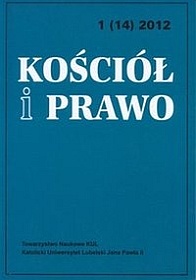Participation in the liturgy of the Holy Mass – concept and requirements
Abstract
The problem connected with the issue of the participation of the Christian faithful in the liturgy of the Holy Mass has always been and still is the subject of many Church documents published by the Popes or the Roman Curia. In particular, term of the participation is identified with Pius X who his concern for an active, full and conscious participation, expressed in motu proprio Tra le sollecitudini from 1903. This issue was also undertaken by his successors and subsequently by the Second Vatican Council. The legislator included the issue concerning the liturgy in canons: 835 § 4; 837; 899 § 2; 1247 of the Code of Canon Law of 1983. The analysis of the law shows that the participation in the liturgy is the realization of the office of sanctifying in the Church. All Christian faithful are obliged to this participation: bishops, presbyters, deacons, and the lays Christian faithful, particularly catholic parents.
The participation in the liturgy is a consequence of belonging to Jesus Christ and the Church. Misunderstanding of participatio actuosa reduces it only to an external aspect of necessity of the general involvement and inclusion in the liturgy the greatest number of people, as often as possible and in front of the others. Meanwhile, the term ‘participation’ indicates an action, in which everyone should take part. Participatio actuosa in the liturgy is a main aim of the liturgical action and allows for the inclusion in celebrating liturgical action of God and the Church. In order to proper participating in the liturgy, the Church gives specific requirements to the Christian faithful, decided that they should not only participate in the liturgy actively but also consciously, in a full way, piously and fruitfully.
References
Bux, Nicola. 2010. Come andare a Messa e non perdere la fede. Milano: Piemme.
Bux, Nicola. 2011. Jak chodzić na Mszę i nie stracić wiary. Z przyczynkiem Vittoria Messiego. Tłumaczenie Marcin Masny. Kraków: Wydawnictwo św. Stanisława BM.
Gryglewicz, Feliks. 1983. „Eucharystia.” W Encyklopedia Katolicka, t. 4, 1239-1241. Lublin: Towarzystwo Naukowe KUL.
Linde, Samuel Bogumił. 1860. Słownik języka polskiego. T. 6. Wyd. 2, poprawne i pomnożone. Lwów: staraniem i nakładem Zakładu Narodowego Imienia Ossolińskich.
Maggiani, Silvano. 2003. “La partecipazione liturgica: diritto-dovere di ogni battezzato.” Rivista Liturgica 1 (90): 49-58.
Nadolski, Bogusław, oprac. 2006. Leksykon liturgii. Poznań: Pallottinum.
Plezia, Marian, red. 2007. Słownik łacińsko-polski. T. 4. Wyd. 2 reprint, 1 dodruk. Warszawa: Wydawnictwo Naukowe PWN SA.
Ratzinger, Joseph. 1998. Sól ziemi: Chrześcijaństwo i Kościół katolicki na przełomie tysiącleci. Tłumaczenie Grzegorz Sowinski. Kraków: Wydawnictwo Znak.
Ratzinger, Joseph. 1999. Nowa pieśń dla Pana. Wiara w Chrystusa a liturgia dzisiaj. Tłumaczenie Juliusz Zychowicz. Kraków: Wydawnictwo Znak.
Ratzinger, Joseph. 2002. Duch liturgii. Tłumaczenie Eliza Pieciul. Poznań: Klub Książki Katolickiej.
Ratzinger, Joseph. 2012. Opera omnia. T. 11, Teologia liturgii. Sakramentalne podstawy życia chrześcijańskiego, red. Krzysztof Góźdź, i Marzena Górecka. Tłumaczenie Wiesław Szymona. Lublin: Wydawnictwo KUL.
S. Aurelius Augustinus. 1865. “Sermo CCCXXIX (a) In Natali Martyrum.” W Patrologiae cursus completus. Series latina, ed. Jacques-Paul Migne, t. 38, 1454-1455. Parisiis: Ex typis – L. Migne.
S. Thomas de Aquino. 1897. Opera omnia iussu impensaquae Leonis XIII P. M. edita, t. IX secunda secundae Summae Theologiae a quaestione LVII ad quaestionem CXXII. Romae ex Typographia Polyglotta S. C. de Propaganda Fide.
Szafrański, Adam L. 1958. Liturgia i jej znaczenie wychowawcze. Lublin: Towarzystwo Naukowe KUL.
Weismayer, Josef. 2005. „Participatio actuosa – mit geistlichem Gewinn.“ Heiliger Dienst 59:146-150.
Wojtyła, Karol. 2002. „Wstęp ogólny.” W Sobór Watykański II, Konstytucje, dekrety, deklaracje, 9-22. Poznań: Pallottinum.
Zdanowicz, Aleksander, Michał Bohusz Szyszke i January Filipowicz, oprac. 1858. Słownik języka polskiego. Z. 20. Wilno: wydany staraniem i kosztem Maurycego Orgelbranda.
Zubert, Bronisław W. 2010. „Prawo do sakramentów świętych.” W Zagadnienia międzywyznaniowe w realizacji misji uświęcającej Kościoła, red. Józef Krukowski, Mirosław Sitarz, i Krzysztof Dziub, 47-63. Lublin: Towarzystwo Naukowe KUL.
Copyright (c) 2012 Kościół i Prawo

This work is licensed under a Creative Commons Attribution-NonCommercial-NoDerivatives 4.0 International License.





